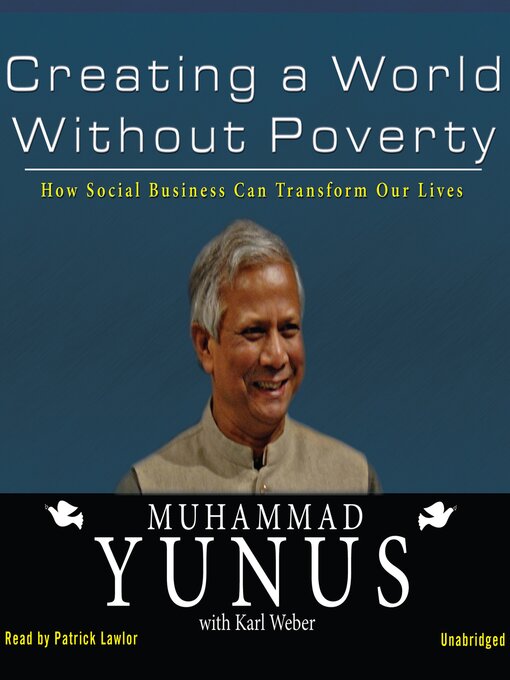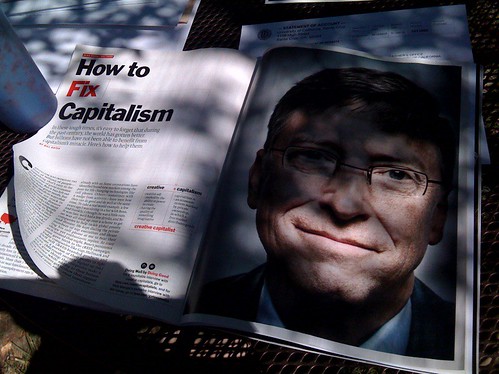the crisis of "latter day capitalism"

I am struggling to attain greater understandings of our global economic and social structure. I was particularly interested in a recent post on Iguana Journal which draws excerpts from Muhammad Yunnus' book "Creating a World without Poverty" which is a book I must get around to reading.
 I am just now reading excerpts from a book "The Work of Nations" by Robert Reich, former US Secretary of Labor as he wrestles with the myriad issues that have arisen in the global marketplace with relation to job creation and employment. According to his argument the US excels at cultivating "symbolic analysts" who possess the type of human capital that is valued most highly in the global labor market. Symbolic analysts are capable of "abstraction, systems thinking, experimenation and collaboration." They work in engineering, research and development, education and communication, and marketing and management industries and so on. But only one "fortunate fifth" of the US population have access to these types of jobs and a large proportion of the rest of the world's population have become "structurally irrelevant" to use Castells term. Reich also warns of the selfishness and lack of social responsibility of the section of the population who end up being in control. But what would effective "social responsibility" look like in our global village? This is the question that I ponder frequently.
I am just now reading excerpts from a book "The Work of Nations" by Robert Reich, former US Secretary of Labor as he wrestles with the myriad issues that have arisen in the global marketplace with relation to job creation and employment. According to his argument the US excels at cultivating "symbolic analysts" who possess the type of human capital that is valued most highly in the global labor market. Symbolic analysts are capable of "abstraction, systems thinking, experimenation and collaboration." They work in engineering, research and development, education and communication, and marketing and management industries and so on. But only one "fortunate fifth" of the US population have access to these types of jobs and a large proportion of the rest of the world's population have become "structurally irrelevant" to use Castells term. Reich also warns of the selfishness and lack of social responsibility of the section of the population who end up being in control. But what would effective "social responsibility" look like in our global village? This is the question that I ponder frequently. A recent issue of Time magazine featured a contribution written by Bill Gates entitled "How to fix capitalism" in which he touts the idea of "creative capitalism" and says things like "...the world will make lasting progress on big inequities that remain...only if governments and non-profits do their part by giving more aid and more effective aid." This strikes me as an extraordinarily limited perspective and yet I feel that I am not possessed of a full explanation for why it is so limited. I'll just start with the sense that this seems to perpetuate a disempowering, patronizing, "deficit model"-- a term some of my dear colleagues are fond of using--and not at all a creative solution...in fact such philanthropy has been tried over and over again and found wanting.
A recent issue of Time magazine featured a contribution written by Bill Gates entitled "How to fix capitalism" in which he touts the idea of "creative capitalism" and says things like "...the world will make lasting progress on big inequities that remain...only if governments and non-profits do their part by giving more aid and more effective aid." This strikes me as an extraordinarily limited perspective and yet I feel that I am not possessed of a full explanation for why it is so limited. I'll just start with the sense that this seems to perpetuate a disempowering, patronizing, "deficit model"-- a term some of my dear colleagues are fond of using--and not at all a creative solution...in fact such philanthropy has been tried over and over again and found wanting. A wise mentor of mine talks about the difference between charity and justice and I am trying to wrap my head around the idea. How is it possible to rework community and societal structures such that they become oriented around higher order values such as human health, happiness and prosperity, and environmental sustainability?
 This all ties into my current listening material. I am listening to the audiobook of the Omnivore's Dilemma by Michael Pollan on those mornings when I manage to get myself out for a walk/run. Readers please note that this is another book on my "YOU-MUST-READ-THIS-BOOK" list. This book has just wowed me in terms of the complete irrationality of the US agricultural system and the extraordinarily serious implications of this set up for the national and global economy, the environment, human physical health and moral/ethical/spiritual well-being. Issues related to sustainable agriculture are a long lost passion of mine but apart from that this book really makes clear the moral bankruptcy of current societal paradigms that are set up for a few people to earn large profits at the HUGE expense of the well-being of humankind and the planet such that our very existence becomes endangered. The book does not feel polemical at all. Just a matter of fact account gleaned from careful research. It is a highly recommended look into what we eat and why. I am an ardent customer at my local farmer's market as a result of reading this book...what else can I do??
This all ties into my current listening material. I am listening to the audiobook of the Omnivore's Dilemma by Michael Pollan on those mornings when I manage to get myself out for a walk/run. Readers please note that this is another book on my "YOU-MUST-READ-THIS-BOOK" list. This book has just wowed me in terms of the complete irrationality of the US agricultural system and the extraordinarily serious implications of this set up for the national and global economy, the environment, human physical health and moral/ethical/spiritual well-being. Issues related to sustainable agriculture are a long lost passion of mine but apart from that this book really makes clear the moral bankruptcy of current societal paradigms that are set up for a few people to earn large profits at the HUGE expense of the well-being of humankind and the planet such that our very existence becomes endangered. The book does not feel polemical at all. Just a matter of fact account gleaned from careful research. It is a highly recommended look into what we eat and why. I am an ardent customer at my local farmer's market as a result of reading this book...what else can I do??I turn to a statement from the Baha'i International Community written in 1995 and entitled "The Prosperity of Humankind" in search of some comfort and inspiration...
"This unprecedented economic crisis, together with the social breakdown it has helped to engender, reflects a profound error of conception about human nature itself. For the levels of response elicited from human beings by the incentives of the prevailing order are not only inadequate, but seem almost irrelevant in the face of world events. We are being shown that, unless the development of society finds a purpose beyond the mere amelioration of material conditions, it will fail of attaining even these goals. That purpose must be sought in spiritual dimensions of life and motivation that transcend a constantly changing economic landscape and an artificially imposed division of human societies into "developed" and "developing".
As the purpose of development is being redefined, it will become necessary also to look again at assumptions about the appropriate roles to be played by the protagonists in the process. The crucial role of government, at whatever level, requires no elaboration. Future generations, however, will find almost incomprehensible the circumstance that, in an age paying tribute to an egalitarian philosophy and related democratic principles, development planning should view the masses of humanity as essentially recipients of benefits from aid and training. Despite acknowledgement of participation as a principle, the scope of the decision making left to most of the world's population is at best secondary, limited to a range of choices formulated by agencies inaccessible to them and determined by goals that are often irreconcilable with their perceptions of reality."
As the purpose of development is being redefined, it will become necessary also to look again at assumptions about the appropriate roles to be played by the protagonists in the process. The crucial role of government, at whatever level, requires no elaboration. Future generations, however, will find almost incomprehensible the circumstance that, in an age paying tribute to an egalitarian philosophy and related democratic principles, development planning should view the masses of humanity as essentially recipients of benefits from aid and training. Despite acknowledgement of participation as a principle, the scope of the decision making left to most of the world's population is at best secondary, limited to a range of choices formulated by agencies inaccessible to them and determined by goals that are often irreconcilable with their perceptions of reality."
...
"The bedrock of a strategy that can engage the world's population in assuming responsibility for its collective destiny must be the consciousness of the oneness of humankind. Deceptively simple in popular discourse, the concept that humanity constitutes a single people presents fundamental challenges to the way that most of the institutions of contemporary society carry out their functions..
...Justice is the one power that can translate the dawning consciousness of humanity's oneness into a collective will through which the necessary structures of global community life can be confidently erected. ... Concern for justice protects the task of defining progress from the temptation to sacrifice the well-being of the generality of humankind -- and even of the planet itself -- to the advantages which technological breakthroughs can make available to privileged minorities."


3 Comments:
Thanks Child of Africa,I really enjoyed this post! I enjoyed the Yunus book and was really inspired by it. Thanks for your discussion of the Baha'i Community statement on poverty. If you haven't already done so, you might want to register your blog with Blog Action Day: http://blogactionday.org/
The theme for this year is poverty
(last year it was the environment, all inter-related themes)
Wow, this is quite a post! May I ask what other gems are found on your YOU-MUST-READ-THIS-BOOK list?
hi iguana :-) thanks so much for your comment. A couple of other things I have recommended here on the blog that I can recall are "Guns, germs and steel", "Three Cups of Tea" and the documentary "Empire of Faith" which traces the history of Islam.
Post a Comment
<< Home